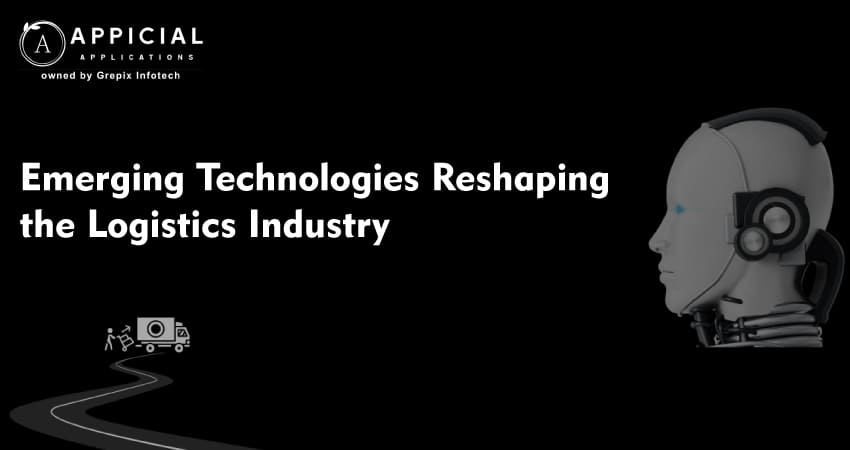
Emerging Technologies Reshaping the Logistics Industry
In the dimly lit corridors of vast warehouses, robots quietly glide, picking and placing packages with unerring precision. On highways, trucks equipped with sensors and AI navigate long stretches, optimizing fuel and time, while drones zip through urban skies, delivering parcels faster than traditional vans stuck in traffic. In control rooms, managers monitor blinking dashboards that predict when a shipment will arrive, what routes are best, and how weather will affect the delivery time.
This isn’t a distant future. This is the logistics industry today, reshaped by emerging technologies that are redefining how goods move from factories to doorsteps.
The logistics sector, often described as the backbone of global trade, is witnessing a transformative era where AI, IoT, blockchain, robotics, drones, 5G, and big data converge to create a seamless, efficient, and transparent ecosystem. These technologies are not just streamlining processes; they are unlocking new customer experiences, enabling agility in supply chains, reducing environmental footprints, and reshaping competitive advantage.
But why is this transformation crucial now? Because customers expect speed, accuracy, and transparency. Supply chains are becoming more complex, and operational inefficiencies are no longer acceptable in a fiercely competitive market. Emerging technologies are the keys that unlock this new potential, allowing logistics providers to future-proof operations, enhance customer satisfaction, and reduce costs.
The logistics industry is undergoing a transformative shift driven by emerging technologies such as AI, IoT, blockchain, and robotics, enhancing efficiency, transparency, and customer satisfaction. As the industry adapts to these innovations, companies like Appicial Applications play a crucial role by integrating these technologies into their operations, promoting agility and intelligence in logistics. Appicial's commitment to staying ahead with cutting-edge technologies ensures its competitive edge in a rapidly evolving market. For logistics providers, embracing these technologies is not just a trend but a necessity to meet the increasing demands of global trade, address challenges proactively, and invest in workforce development. This commitment paves the way for a more connected and efficient future, where logistics operations are not only optimized for today but are also scalable for tomorrow's needs.
Emerging Technologies in Logistics
Emerging technologies refer to innovations that represent progressive developments within a field for competitive advantage. Logistics include Artificial Intelligence (AI), the Internet of Things (IoT), blockchain, robotics, autonomous vehicles, drones, 5G connectivity, and big data analytics. Their integration into logistics operations heralds a new era of efficiency, transparency, and agility.
1 AI and Machine Learning
Artificial Intelligence and Machine Learning are at the forefront of technological integration in logistics app. Predictive analytics, powered by AI, enable companies to forecast demand with unprecedented accuracy, reducing inventory costs and minimizing stockouts. Machine learning algorithms optimize routes by analyzing traffic patterns, weather conditions, and delivery constraints, reducing transit times and fuel consumption.
In warehouse management, AI-driven automation streamlines inventory control, order picking, and restocking processes. AI-powered chatbots enhance customer service by instant responses to inquiries, tracking information, and resolving common issues without human intervention.
2 Internet of Things (IoT) in Logistics
The Internet of Things connects physical devices embedded with sensors and software, facilitating real-time data exchange. In logistics, IoT enables real-time tracking of shipments through GPS and RFID technologies, providing visibility throughout the supply chain. Smart warehousing utilizes IoT sensors to monitor inventory levels, environmental conditions, and equipment performance, leading to proactive maintenance and reduced downtime.
Fleet management benefits from IoT by monitoring vehicle health, and driver behavior, and optimizing fuel efficiency. In cold chain logistics, IoT devices monitor temperature-sensitive goods, ensuring compliance with quality standards and reducing spoilage.
3 Blockchain Technology
Blockchain introduces a decentralized ledger system that enhances security and transparency in logistics operations. By recording transactions in an immutable ledger, blockchain mitigates fraud and errors. Smart contracts automate transactions when predefined conditions are met, reducing administrative overhead and expediting processes.
For instance, blockchain can track the provenance of goods, ensuring authenticity and compliance with regulations. This is particularly vital in industries like pharmaceuticals and food, where traceability is critical.
4 Robotics and Automation
Robotics and automation are revolutionizing warehouse and fulfillment operations. Automated Guided Vehicles (AGVs) transport goods within warehouses without human intervention, increasing efficiency and reducing accidents. Robotic arms and automated sorting systems expedite the handling of packages, minimizing errors and labor costs.
Robotic Process Automation (RPA) streamlines back-office operations by automating repetitive tasks such as data entry, invoicing, and order processing, allowing human workers to focus on more strategic activities.
Also Read: Role of Dynamic Pricing in Maximizing Profits for Taxi Apps
5 Autonomous Vehicles and Drones
The advent of autonomous vehicles promises to transform long-haul transportation. Self-driving trucks can operate continuously without the limitations of human drivers, potentially reducing delivery times and operating costs. While regulatory and safety challenges remain, pilot programs are demonstrating the viability of this technology.
Drones offer innovative solutions for last-mile delivery, especially in remote or congested urban areas. They can bypass traffic and terrain obstacles, delivering goods faster. Companies like Amazon and UPS are exploring drone delivery services, although widespread adoption depends on regulatory approvals and technological refinement.
6 5G and Connectivity
The rollout of 5G networks enhances connectivity with higher speeds and lower latency. For logistics, this means faster data transmission between IoT devices, vehicles, and central systems. Enhanced connectivity supports real-time decision-making, autonomous vehicle operation, and robust communication networks essential for complex logistics operations.
7 Big Data Analytics
The logistics industry generates vast amounts of data. Big data analytics enables companies to harness this data for insights into operational efficiency, customer behavior, and market trends. By analyzing data from various sources, logistics providers can optimize routes, forecast demand, manage risks, and tailor services to customer needs. Data-driven decision-making leads to improved service levels, reduced costs, and the ability to respond swiftly to changing market conditions.
8 Sustainability and Green Technologies
Sustainability is becoming a key concern in logistics. Emerging technologies contribute to environmental goals through electric vehicles, which reduce emissions. Route optimization software minimizes fuel consumption by selecting the most efficient paths. Eco-friendly packaging solutions reduce waste and appeal to environmentally-conscious consumers.
Companies are leveraging technology to monitor and report on their environmental impact, meeting regulatory requirements and enhancing corporate social responsibility profiles.
Challenges and Considerations
While the advantages of emerging technologies in logistics are undeniable, the path to adoption is not without hurdles. The promise of real-time tracking, automation, and predictive analytics comes with challenges that logistics providers must address to transform innovation into operational success.
1. Cybersecurity Risks in a Hyperconnected Logistics Ecosystem
Imagine a logistics ecosystem where thousands of IoT sensors, connected vehicles, and cloud systems exchange data in real time. While this connectivity enhances visibility and decision-making, it also opens the door to cybersecurity vulnerabilities.
Cyber threats such as ransomware, data breaches, and supply chain attacks can disrupt operations, compromise sensitive customer and shipment data, and damage brand reputation. For example, a cyberattack that disables a fleet’s GPS tracking or warehouse management system could lead to shipment delays and revenue loss.
To overcome these risks, logistics companies need to:
- Implement robust encryption protocols and secure data management practices.
- Conduct regular cybersecurity audits and vulnerability assessments.
- Invest in employee training to recognize phishing and social engineering attacks.
- Establish incident response plans to minimize downtime during cyber incidents.
By prioritizing cybersecurity, logistics providers can ensure that their technological advancements do not become gateways for malicious activities.
2. Regulatory Challenges for Drones and Autonomous Vehicles
Emerging technologies like drones and autonomous vehicles promise faster deliveries and operational efficiencies, but regulatory compliance remains a significant roadblock.
For instance, airspace regulations often limit the use of drones for commercial deliveries in many regions due to safety, privacy, and noise concerns. Similarly, self-driving trucks face complex regulatory landscapes concerning safety standards, insurance, and liability frameworks.
Overcoming regulatory hurdles requires:
- Collaboration with regulatory authorities to participate in pilot programs for drones and autonomous vehicles.
- Investing in technology that meets evolving compliance standards, such as safety sensors and communication systems for autonomous operations.
- Engaging with industry associations to advocate for regulatory frameworks that support innovation while ensuring safety.
By aligning technology adoption strategies with regulatory developments, logistics companies can gradually integrate drones and autonomous vehicles into their operations while ensuring compliance and community trust.
3. Workforce Displacement and the Need for Upskilling
Automation, robotics, and AI adoption in logistics often raise concerns about workforce displacement. Replacing manual tasks with automated processes can reduce the need for certain roles, leading to uncertainty among employees.
However, the transition to technology-driven logistics does not eliminate the need for a human workforce; it reshapes it.
To address workforce displacement:
- Logistics providers should invest in reskilling and upskilling programs, enabling employees to manage, operate, and maintain advanced technologies.
- Roles can evolve from manual sorting to managing automated systems, monitoring AI outputs, and analyzing data for strategic decision-making.
- Encouraging a culture of continuous learning ensures employees remain adaptable as the industry evolves.
Companies that proactively prepare their workforce for this technological shift will not only minimize resistance but also empower employees to contribute effectively in a digitally driven logistics landscape.
4. High Initial Costs of Infrastructure Upgrades
Integrating technologies like AI, IoT, robotics, and blockchain often requires significant upfront investment in hardware, software, and skilled personnel. For many logistics companies, particularly small and medium-sized enterprises, these high initial costs can pose a barrier.
The challenge lies in justifying the return on investment while managing operational budgets.
To address this:
- Companies can adopt a phased implementation strategy, focusing on high-impact areas first, such as predictive route optimization or warehouse automation, to generate quick ROI.
- Exploring partnerships with technology providers can reduce costs through customized solutions and flexible payment models.
- Leveraging government incentives or grants for technology adoption and sustainability initiatives can ease the financial burden.
By strategically managing investments, logistics providers can modernize their operations without compromising financial stability.
Conclusion
The logistics industry is set to undergo a radical transformation in this era of rapid technological advancement, driven by the adoption of cutting-edge technologies like robotics, blockchain, artificial intelligence, and the Internet of Things. These developments are changing the definition of competitive advantage and customer satisfaction and increasing operational efficiency. Being on the cutting edge of these advancements is essential to utilizing these technologies to their fullest potential to optimize processes and spur expansion, according to Appicial Applications, a top logistics app development company.
As these technologies mature, they present a unique opportunity for logistics providers to transform traditional processes into dynamic, efficient, and transparent systems. However, the adoption of these technologies also comes with its set of challenges, including cybersecurity risks, regulatory compliance issues, and the need for workforce adaptation to new operational paradigms.
Appicial recognizes the importance of proactively addressing these challenges. By investing in continuous technological upgrades, focusing on workforce training, and maintaining a commitment to innovation, Appicial is poised to lead in the logistics industry. Embracing these technological advancements will enable us not only to improve its service offerings to contribute to a more connected, efficient, and sustainable global logistics network.
Looking to revolutionize the logistics industry? Try our powerful Logistics App Development the smartest way to launch and scale your logistics business with ease!




